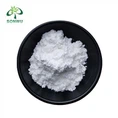Amino 3 phenylbutyric acid structure
Phenibut powder, also known as phenibut hydrochloride or 4-amino-3-phenylbutyric acid hydrochloride, is a synthetic form of GABA, a primarily inhibitory neurotransmitter. Its chemical structure is a GABA molecule with a phenyl ring attached. When you ingest it as a supplement, GABA itself cannot cross the blood-brain barrier. Still, the addition of the phenyl ring acts as a delivery system, allowing the compound to pass from the bloodstream and interact directly with neurons in the brain. The result is higher levels of GABA activity in the brain that better regulate overexcitement and anxiety. Powder or capsules are the most popular ways to purchase this most commonly used nootropic supplement, which is often used to promote relaxation, improve mood, and help fall asleep more easily. Some studies have even found that it may positively affect attention and mental ability.
It is often used in the preparation of antidepressants. It is an essential pharmaceutical intermediate in laboratory research, development, and chemical pharmaceutical production processes. If you are interested in this product, please get in touch with Xi'an Sonwu. Xi'an Sonwu can supply phenibut nootropics for a long time.

Is Phenibut An Antidepressant
4-amino-3-phenylbutyric acid hydrochloride is not an antidepressant. It is a central nervous system depressant derivative of the neurotransmitter GABA (gamma-aminobutyric acid). It is used in some countries primarily for its anxiolytic (anxiety-reducing) and nootropic (cognition-enhancing) properties. Developed in the Soviet Union in the 1960s, it is used in Russia and some other countries to treat anxiety, insomnia, and various other conditions. It mimics the effects of GABA, an inhibitory neurotransmitter in the brain. By binding to GABA receptors, phenylbutyric acid can produce sedative effects, reduce anxiety, and promote relaxation.
A class of medications known as antidepressants is used to treat mood disorders, including depression. Common antidepressants are divided into the following main categories: Selective serotonin reuptake inhibitors (SSRIs); these drugs improve mood by increasing the levels of serotonin (also known as serotonin) in the brain. Depression is treated with medications called selective serotonin and norepinephrine reuptake inhibitors (SNRIs), which increase serotonin and norepinephrine levels. Both the older class of antidepressants, known as tricyclic antidepressants (TCAs), and the newer type, known as monoamine oxidase inhibitors (MAOIs), raise serotonin, norepinephrine, and dopamine levels by blocking the function of the enzyme monoamine oxidase.
What Does Phenibut Do To The Brain
4-amino-3-phenylbutyric acid hydrochloride affects the brain primarily by interacting with GABA (gamma-aminobutyric acid) receptors.
1. Mechanism of Action
GABA-B Receptor Agonist
It is a GABA-B receptor agonist, which means it binds to these receptors and activates them. GABA-B receptors are inhibitory neurotransmitters, and their activation calms the nervous system, reducing neuronal excitability.
GABA-A Receptor Modulation
It may also have some effects on GABA-A receptors, although this is less well documented than its effects on GABA-B receptors. GABA-A receptor activation also produces an inhibitory effect, resulting in anxiolytic (anxiety-reducing) properties.
Dopamine Receptor Interactions
It can affect dopamine receptors, specifically by increasing dopamine levels in the brain. One neurotransmitter that may help elevate mood is dopamine, which is also linked to motivation, reward, and mood.
2. Effects on the Brain
Anti-anxiety Effects
Its potent anti-anxiety qualities aid in lowering anxiety and promoting relaxation by increasing GABAergic activity.
Sedation and Sleep Induction
The soothing effects on the central nervous system can promote sleep and help treat insomnia.
Mood Enhancement
Phenibut can improve mood and produce euphoria at higher doses through its effects on the dopamine and GABA systems.
Cognitive Enhancement
Some users report improved cognitive function, such as increased attention, memory, and clarity of thought, but this is not a universal experience and is less supported by clinical research.
Some studies suggest that phenylbutyrate may have neuroprotective effects, potentially protecting brain cells from damage.

3. Risks and Side Effects
Side Effects
Fatigue, headaches, nausea, and dizziness are typical adverse effects. Greater dosages may cause more severe side effects, such as drowsiness and impaired motor function.
Withdrawal Symptoms
When long-term use is abruptly stopped, withdrawal symptoms, including anxiety, restlessness, irritability, and, in extreme situations, seizures and hallucinations, can occur.
Overdose Risk
High doses of it can be toxic and lead to overdose, which may result in severe sedation, loss of consciousness, and respiratory depression.
FAQ
Common Dosage Recommendations
Starting Dosage
It is often recommended to start with a lower dose to assess individual response and tolerance. Ordinary starting doses are 250-500 mg.
Common Dosages
The standard dosage range for most people is between 500-1500 mg. This dosage range is often used to relieve anxiety, improve sleep, or enhance mood.
High Dosages
Some experienced users may use doses as high as 2000 mg or more. However, higher doses significantly increase the risk of side effects and dependence, so high doses are not recommended without medical supervision.
Recommended Formulations

Powder and Capsule Forms
Phenibut can be purchased in powder or capsule form. The powder form is more accessible for adjusting the dose, but the capsule form is more convenient and tastes more acceptable.
Pairing with Caffeine
Some users report that taking it with caffeine can enhance focus and energy levels while reducing the anxiety side effects of caffeine.
Pairing with Theanine
Theanine, which is found in green tea, is relaxing and anxiety-reducing. Pairing it with it can enhance its relaxing impacts while reducing the potential for over-sedation.
If you want to know the 4-amino-3-phenylbutyric acid hydrochloride price, are interested in Xi'an Sonwu, or have other questions about the product, do not hesitate to contact Xi'an Sonwu.
Email: sales@sonwu.com





